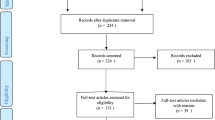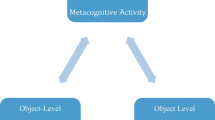Abstract
The purpose of this paper is to describe various “tools” we use to facilitate critical reflection as we teach prospective science teachers. The notion of “tools” refers to materials and experiences used to facilitate prospective teachers’ critical reflection on science teaching and learning. Reflective tools are not intrusive devices used by instructors to analyse mechanically what prospective teachers are learning; rather, these tools are intended to provide prospective teachers with the means to generate and critique their own views of science teaching and learning. Each tool is described herein with respect to its potential use and the way in which it is introduced to prospective science teachers. We conclude with discussion of the potential for reflective tools to contribute to research on reform of science teacher education, with particular attention to primary teacher preparation.
Similar content being viewed by others
References
Barrow, D. (1993). The use of portfolios to assess student learning.Journal of College Science Teaching, 22(3), 148–153.
Belanoff, P., & Dickson, M. (1991).Portfolios: Process and product. Portsmouth, NH: Brynton/Cook Publishers.
Beyer, L., & Apple, M. (1988). Values and politics in the curriculum. In L. Beyer & M. Apple (Eds.),The curriculum: Problems, politics, and possibilities (pp. 3–15). New York: State University of New York.
Briscoe, C. (1991). The dynamic interactions among beliefs, roles, metaphors, and teaching practices: A case study of teacher change.Science Education, 75(2), 186–199.
Bruner, J. (1986).Actual minds, possible worlds. Cambridge, MA: Harvard University Press.
Bullough, R. V., & Gitlin, A. D. (1991). Educative communities and the development of the reflective practitioner. In R. Tabachnich & K. Zeichner (Eds.),Issues and practices in inquiry-oriented teacher education (pp. 35–55). Bristol, PA: Falmer Press.
Carr, W., & Kemmis, S. (1986).Becoming critical: Education, knowledge and action research. Philadelphia, PA: Falmer Press.
Carter, K. (1989). A curriculum for an initial-year-of-teaching program.Elementary School Journal, 89(4), 405–419.
Collins, A. (1992). Porfolios for science education: Issues in purpose, structure, and authenticity.Science Education, 76(4), 451–463.
Cortazzi, M. (1993).Narrative analysis. Washington, DC: Falmer Press.
Dana, T., & Tippins, D. (in press). Portfolios, reflection and educating prospective teachers of science. In K. Tobin & B. Fraser (Eds.),International handbook of science education. Dordrecht, The Netherlands: Kluwer.
Dana, T. (1992, April).Performance and portfolio assessment in science teacher education. Paper presented at the annual meeting of the National Association for Research in Science Teaching, Atlanta, GA.
Dana, T., & Dana, N. (1995, April).A look at cases in the development of reflective practice: A case study of prospective teachers of elementary science. Paper presented at the annual meeting of the National Association for Research in Science Teaching, San Francisco, CA.
Dewey, J. (1929).The sources of a science of science education. New York, NY: Horace Liveright.
Dewey, J. (1933).How we think. New York, NY: Heath and Company.
Drake, S. (1991). The journey of the learner: Personal and universal story.The Educational Forum, 56, 47–59.
Duckworth, E. (1986). Teaching as research.Harvard Educational Review, 56, 481–495.
Duschl, R., & Gitomer, D. (1991). Epistemological perspectives on conceptual change: Implications for educational practice.Journal of Research in Science Teaching, 28 (9), 839–858.
Garner, J. F. (1994).Politically correct bedtime stories. New York, NY: Macmillan.
Giroux, H. (1997). Are Disney movies good for your kids? In J. Kinchelo & S. Steinberg (Eds.),Kinderculture: The corporate construction of childhood (pp. 53–68). Boulder, CO: Westview Press.
Gozzi, R. Jr. (1991, March).The metaphor of the mind-as computer: Some considerations for teachers. Paper presented at the annual meeting of the conference on College Composition and Communication. Boston, MA.
Grumet, M. (1987). The politics of personal knowledge.Curriculum Inquiry, 17, 319–329.
Harding, S. (1991).Whose science? Whose knowledge? Thinking from women’s lives. Ithaca, NY: Cornell University Press.
Harrington, H., & Garrison, J. (1992). Cases as shared inquiry: A dialogical model of teacher preparation.American Educational Research Journal, 29 (4) 715–735.
Hatch, J., & Wisniewski, R. (1995). Life history and narrative: Questions, issues, and exemplary works. In J. Hatch & R. Wisniewski (Eds.),Life history and narrative (pp. 113–136). Washington, DC: The Falmer Press.
Kagan, D., & Tippins, D. (1991). How teachers’ classroom cases express their pedagogical beliefs.Journal of Teacher Education, 42 (4), 281–291.
Kahle, J. (1989). Images of scientists: Gender issues in science classrooms.What research says to the science and mathematics teacher (Vol. 4), Perth, Australia: The Key Centre for School Science and Mathematics.
Kahle, J., & Meece, J. (1994). Research on gender issues in the classrom. In D. Gabel (Ed.),Handbook of research in science teaching and learning (pp. 542–557). New York, NY: Macmillan Publishing.
Kleinfield, J. S. (1988).Teaching cases in cross-cultural education. Faibranks, AK: University of Alaska Press.
Koballa, T. Jr., & French, M. J. (1995). Dilemmas, decisions, and recommendations: Personal empowerment in an elementary science methods course.Journal of Science Teacher Education, 6 (2), 61–70.
Kowalski, T. J., Weaver, R. A., & Henson, K. T. (1990).Case studies on teaching. New York, NY: Longman.
Lakoff, G., & Johnson, M. (1980).Metaphors we live by. Chicago: University of Chicago Press.
MacIssac, D., & Jackson, L. (1992). Protfolio assessment process and outcomes.Portfolio News, 4 (1), 12–13.
McGinnis, R., Tobin, K., & Koballa, T. (1997).Teaching science methods to women: Three tales of men professors reflecting on their practices. Symposium presented at the annual meeting of the National Association for Research in Science Teaching, Oakbrook, Illinois, USA.
McRobbie, C., & Tobin, K. (1995). Restraints to reform: The congruence of teacher and student actions in a chemistry classroom.Journal of Research in Science Teaching, 32 (4), 373–385.
Munby, H. (1986). Metaphor in the thinking of teachers: An exploratory study.Journal of Curriculum Studies, 18, 197–209.
Nichols, S., Gilmer, P., Thompson, T., & Davis, N. (in press). Women in science: Expanding the vision. In K. Tobin & B. Fraser (Eds.),International handbook of science education. Dordrecht, The Netherlands: Kluwer Publishers.
Nichols, S., & Tippins, D. (1997, March).Generating prospective elementary teachers’ personal understandings about the phenomena of science teaching and learning. Paper presented at the annual meeting of the National Association for Research in Science Teaching, Oak Brook, Illinois.
Parker, W., & McDaniel, J. (1992). Bricolage: Teachers do it daily. In I. Ross, E. Wayne, J. Cornett, & G. McCutcheon (Eds.),Teacher personal theorizing: Connecting curriculum practice, theory, and research (pp. 97–114). Albany, NY: State University of New York Press.
Rodriguez, A. J., (1997).Strategies for counter-resistance: Helping preservice teachers teach science for understanding and for social justice. Paper presented at the annual meeting of the National Association for Research in Science Teaching, Oakbrook, Illinois, USA.
Roth, W. M. (1991, April).Aspects of cognitive apprenticeship in science teaching. Paper presented at the annual meeting of the National Association for Research in Science Teaching, Lake Geneva, WI.
Santora, E. (1995).Becoming a teacher: Portfolios, process and practice. Unpublished manuscript, Pennsylvania State University, State College, PA.
Schön, D. (1983).The reflective practitioner: How professionals think in action. New York, NY: Basic Books.
Schön, D. (1987).Educating the reflective practitioner: Toward a new design for teaching and learning in the professions. San Francisco: Jossey-Bass.
Shulman, L. (1992a).Case methods in teacher education. New York, NY: Teachers College Press.
Shulman, L. (1992b, April).Portfolios for teacher education: A component of reflective teacher education. Paper presented at the annual meeting of the American Educational Research Association, San Francisco, CA.
Tippins, D., Veal, W., & Wieseman, K. (1994, April).An exploratory study of the role of proverbs in the construction of knowledge about science teaching and learning. Paper presented at the annual meeting of the National Association for Research in Science Teaching, San Francisco, CA.
Tippins, D., Dana, T., & Kamen, M. (1994, January).Protfolio assessment in science teacher education: A vehicle for growth in pedagogical content knowledge? Paper presented at the annual meeting of the Association for the Education of Teachers in Science, El Paso, Texas.
Tobin, K., Kahle, J., & Fraser, B. (1990).Windows into science classrooms: Problems associated with high level cognitive learing in science. London: Falmer Press.
Tobin, K., Tippins, D., & Hook, K. S. (1994). References for chaning a science curriculum: A case study of one teacher’s change in beliefs.Science & Education, 3 (3), 245–264.
Tobin, K., Tippins, D., & Gallard, A. (1994). Research on instructional strategies for teaching science. In D. Gabel (Ed.),Handbook of research on science teaching and learning (pp. 45–93). New York: Macmillan.
Tobin, K., & Ulerick, S. (1989, April).An interpretation of high school science teaching based on metaphors and beliefs for specific roles. Paper presented at the annual meeting of the American Educational Research Association, San Francisco, CA.
Walker, N. (1995).The disobedient writer: Women and narrative tradition. Austin, TX: University of Texas Press.
Wertsch, J. (1991).Voices of the mind: A sociocultural approach to mediated action. Cambridge, Massachusetts: Harvard University Press.
White, G. M. (1987). Proverbs and cultural models. An American psychology of problem solving. In D. Holland & N. Quinn (Eds.),Cultural models in language and thought (pp. 151–171). New York, NY: Cambridge University Press.
Wolf, K. (1994). Teaching protfolios: Capturing the complexity of teaching. In L. Ingvarson & R. Chadbourne (Eds.),Valuing teachers’ work: New directions in teacher appraisal (pp. 12–136). Melbourne, VIC.: The Australian Council for Educational Research.
Wubbels, T., Korthagen, F., & Dolk, M. (1992, April).Conceptual change approaches in teacher education: Cognition and action. Paper presented at the annual meeting of the American Educational Research Association, San Francisco, CA.
Author information
Authors and Affiliations
Corresponding author
Rights and permissions
About this article
Cite this article
Nichols, S.E., Tippins, D. & Wieseman, K. A “Toolkit” for developing critically reflective science teachers. Research in Science Education 27, 175–194 (1997). https://doi.org/10.1007/BF02461315
Issue Date:
DOI: https://doi.org/10.1007/BF02461315




